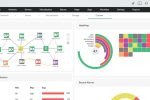By. Carey Anderson, Founder & CEO, 1datapipe
In late November, Irfan Sanusi Sitanggang of the Financial Services Authority (OJK) said that despite financial inclusion surpassing 85% in Indonesia, less than half the population could be deemed financially literate. The OJK’s own official figures show that both metrics are growing, even across genders and regions. That being said, Irfan is right in pointing out that the gap between inclusion and literacy needs to be bridged – and fast.
Just between April and June last year, the government’s Task Force for Handling Unlicensed Businesses in Financial Sector detected hundreds of illegal online loan platforms and dozens of social media content offering illegal loans. This is in addition to the rise and rise of money transfer scams, which as the task force notes, are increasingly sophisticated at earning the trust of the average person.
Leaving No One Behind
The fact is, people must be equipped with the knowledge and skills to make informed decisions, especially as the Indonesian government continues efforts to bring more people into the financial system. When people understand concepts like budgeting, saving, and investing, they are less susceptible to financial shocks and are better positioned to weather economic downturns.
Meanwhile, when people lack literacy they are also more likely to be disenfranchised. This could perpetuate the condition of being unbanked or underbanked, which then limits opportunities to save, invest, and pursue entrepreneurship. Take for example data from the OJK, which shows the shrinking of the urban-rural divide, in both inclusion and literacy from 2019 to 2022. However, the growth in urban regions has been far outpaced by that seen in rural ones.
This would suggest that there might be stagnation in more developed areas on this front, which would be less of a problem if literacy and inclusion stood closer to 100%. As it stands, the figures from OJK imply that there are still many underserved people in urban areas, albeit not as high as in rural areas. For a country as diverse as Indonesia, this is a major hurdle to its own development as it doesn’t just impact citizens’ ability to participate in the economy today but also as they age, which will have repercussions as life expectancy increases.
Coupling literacy and inclusion also fosters innovation and entrepreneurship by providing individuals with the capital needed to start and grow businesses. This comprehensive approach not only improves quality of life but also drives economic growth and social development, creating a more equitable and resilient financial system.
Banking’s Leading Role
To support financial inclusion and literacy, banks can play a leading role in expanding access to services and knowledge to Indonesians. In fact, it is now imperative that they do so after the OJK introduced Regulation Number 3 2023, which mandates financial service providers to invest in financial literacy programs at least twice yearly. That rests on understanding customers and the range of risk appetites they may have.
Here is where AI-powered customer analytics risk scores come in, as they can cater to the evolving requirements of Indonesia’s dynamic customer-focused landscape. Through AI models that promote seamless integration and instant accuracy, banks can leverage protection against fraud with cutting-edge algorithms that safeguard assets and reputations.
Moreover, AI has opened avenues to transform credit trust via its ability to pull from larger, more diverse datasets. These models enable smarter lending decisions that also expands credit access. In addition, this empowers more robust financial inclusion scores that still mitigate fraud risk. For instance, some AI-powered tools come with income estimation models and geolifestyle scores that predict preferences and behaviors beyond demographics, empowering tailored strategies.
Ultimately, inclusion hinges on people understanding the consequences of their financial decisions. Banks, obviously, play a key role in helping people do this, but they too must understand customers at a more granular and deeper level. That’s why leveraging AI-powered tools will be a game changer in Indonesia’s bid to raise financial inclusion through literacy.




















